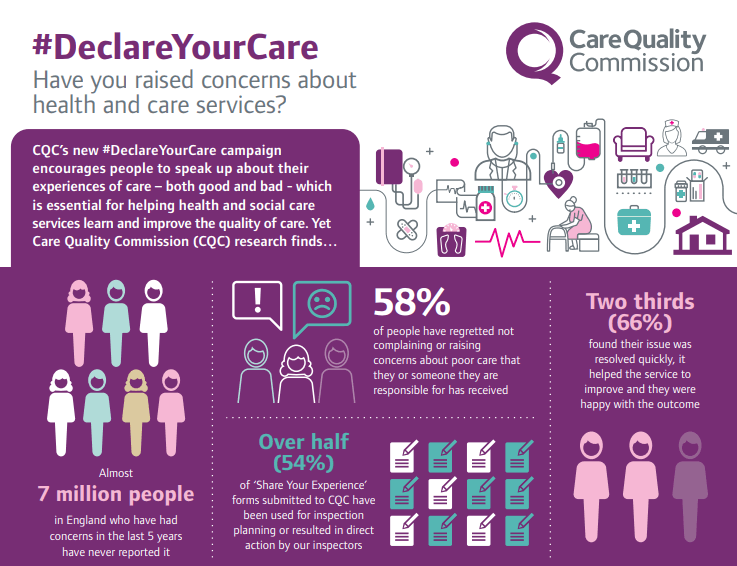Millions don’t raise their concerns over care.
Few people like to complain, especially when there is a risk of conflict. The same applies if it involves issues of a personal nature. That’s why it is so difficult for most of use to raise concerns about care, whether it involves us personally or a loved one. We often feel that carers are doing their best under difficult circumstances and we don’t want to add to their burden.
Care Quality Commission’s #DeclareYourCare Campaign
Improving the quality of care is everyone’s business, whether it is in a care home, a hospital or a medical centre. This is more likely to happen if we have an open and honest public conversation about the care we experience, whether it is good or poor. We need to raise concerns about poor care, so that it may be put right. But we also need to highlight good and best practice, so that others may learn from this positive experience.
That’s why CURA is supporting #DeclareYourCare, a new campaign by the Care Quality Commission (CQC). The CQC is the independent regulator of all health and social care services in England. Its year-long campaign encourages people to share their experiences of care. Not just poor care, but good care too.
The campaign builds on research by the CQC, which shows people regret not raising concerns about their care, while those who do raise concerns see improvements. According to the CQC, almost seven million people with concerns about their care in the past five years did not make a complaint. The research also found that 58 percent of these people regretted not raising their concerns. Of those who did raise a concern or complaint, 66 percent found the issue was quickly resolved, it helped the service to improve and they were happy with the outcome.
The CQC research also reveals the reasons why people said they didn’t raise their concerns:
- The feeling that nothing would change as a result (37 percent).
- Not knowing who to raise their concerns with (33 percent).
- Not wanting to be seen as a troublemaker (33 percent).
- Worrying about not being taken seriously (28 percent).
- Not knowing how to raise their complaint (20 percent).
With one in three people admitting that they did not know how to raise a concern or make a complaint, the CQC is reminding all providers of the importance of making sure that service users and their loved ones are aware that processes are in place to respond to their concerns.
Speak to the care home or agency care manager to give them a chance to investigate, explain and put things right. Tell them what you want them to do. Don’t be worried about raising issues. If you don’t speak up, then improvements can’t be made or problems resolved. A manager may not be aware there is an issue until you raise it. Most problems can be easily resolved at this stage; however, you may wish to agree a time frame for a resolution.
Keep accurate records of your complaint and any communication.
Put everything in writing so there’s a record of correspondence, keep notes of telephone calls and meetings, and keep a diary of issues relating to your complaint.
Cura’s priority is the high-quality, safe care of residents.
Our Care Home Management Solutions are focused on ensuring that residents feel reassured, more involved and have confidence in their care home.
When carers use Cura’s electronic care agency software to deliver your care they are ensuring a more personalised and reliable service. The care planning system also monitors the safety of your environment so that you can feel more content.
Cura also gives reassurance to your loved ones.
Our mobile care monitoring app, Cura Kin, gives authorised family members and friends secure access to information about your daily well-being, meals, participation in activities and much more. Cura Kin also allows family members to keep residents informed of their news with messages and photos.
The most important thing is that you should not feel afraid to speak up. If you don’t raise concerns, nothing can be done about them. Raising awareness of problems could help to make things better, as well as raising awareness for other people being cared for by the same provider.

